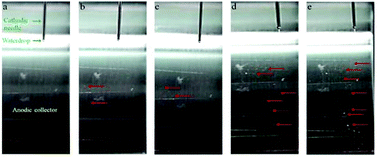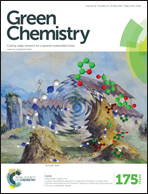An environmentally friendly etching agent: vapor from hot electron-activated liquid water†
Abstract
A novel strategy for an environmentally friendly etching process is proposed based on the vapor from hot electron-activated (HEA) water, in which, HEA water with a weakly hydrogen-bonded structure is neutral. Compared to the vapor from deionized (DI) water, the vapor from HEA water exhibits a facile etching process to a glass sheet after exposing it to vapor at room temperature. The etched glass sheet demonstrates a granular surface morphology with a hydrophobic structure. In addition, the resulting nanostructured glass shows a uniform signal intensity of surface-enhanced Raman scattering (SERS) of rhodamine 6G (R6G). This is favorable for developing reliable sensors. The adhesion of deposited metals on the etched glass is also enhanced. Furthermore, the distortion and reformation of the deposited gold nanoparticles (AuNPs) by vapor from HEA water were observed. It suggests that this vapor has higher energy than conventional DI water does. This innovative concept has emerged as a promising strategy for environmentally friendly nanostructured etching.


 Please wait while we load your content...
Please wait while we load your content...